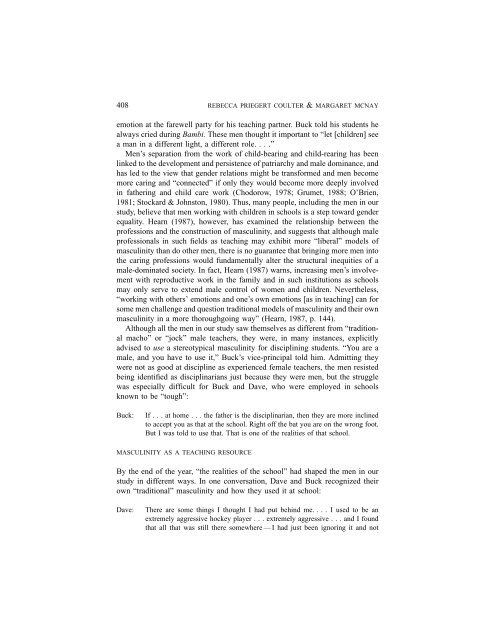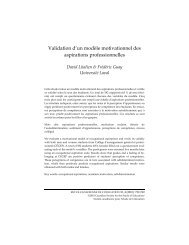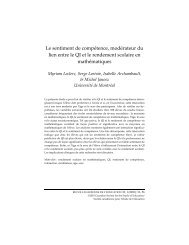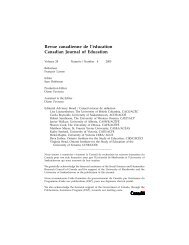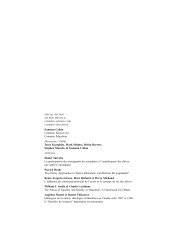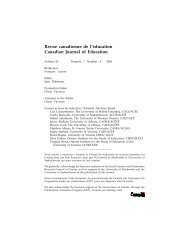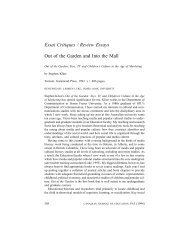Mireille Falardeau et Michel Loranger Le choix de stratégies ... - CSSE
Mireille Falardeau et Michel Loranger Le choix de stratégies ... - CSSE
Mireille Falardeau et Michel Loranger Le choix de stratégies ... - CSSE
You also want an ePaper? Increase the reach of your titles
YUMPU automatically turns print PDFs into web optimized ePapers that Google loves.
408 REBECCA PRIEGERT COULTER & MARGARET MCNAY<br />
emotion at the farewell party for his teaching partner. Buck told his stu<strong>de</strong>nts he<br />
always cried during Bambi. These men thought it important to “l<strong>et</strong> [children] see<br />
a man in a different light, a different role. ...”<br />
Men’s separation from the work of child-bearing and child-rearing has been<br />
linked to the <strong>de</strong>velopment and persistence of patriarchy and male dominance, and<br />
has led to the view that gen<strong>de</strong>r relations might be transformed and men become<br />
more caring and “connected” if only they would become more <strong>de</strong>eply involved<br />
in fathering and child care work (Chodorow, 1978; Grum<strong>et</strong>, 1988; O’Brien,<br />
1981; Stockard & Johnston, 1980). Thus, many people, including the men in our<br />
study, believe that men working with children in schools is a step toward gen<strong>de</strong>r<br />
equality. Hearn (1987), however, has examined the relationship b<strong>et</strong>ween the<br />
professions and the construction of masculinity, and suggests that although male<br />
professionals in such fields as teaching may exhibit more “liberal” mo<strong>de</strong>ls of<br />
masculinity than do other men, there is no guarantee that bringing more men into<br />
the caring professions would fundamentally alter the structural inequities of a<br />
male-dominated soci<strong>et</strong>y. In fact, Hearn (1987) warns, increasing men’s involvement<br />
with reproductive work in the family and in such institutions as schools<br />
may only serve to extend male control of women and children. Nevertheless,<br />
“working with others’ emotions and one’s own emotions [as in teaching] can for<br />
some men challenge and question traditional mo<strong>de</strong>ls of masculinity and their own<br />
masculinity in a more thoroughgoing way” (Hearn, 1987, p. 144).<br />
Although all the men in our study saw themselves as different from “traditional<br />
macho” or “jock” male teachers, they were, in many instances, explicitly<br />
advised to use a stereotypical masculinity for disciplining stu<strong>de</strong>nts. “You are a<br />
male, and you have to use it,” Buck’s vice-principal told him. Admitting they<br />
were not as good at discipline as experienced female teachers, the men resisted<br />
being i<strong>de</strong>ntified as disciplinarians just because they were men, but the struggle<br />
was especially difficult for Buck and Dave, who were employed in schools<br />
known to be “tough”:<br />
Buck: If . . . at home . . . the father is the disciplinarian, then they are more inclined<br />
to accept you as that at the school. Right off the bat you are on the wrong foot.<br />
But I was told to use that. That is one of the realities of that school.<br />
MASCULINITY AS A TEACHING RESOURCE<br />
By the end of the year, “the realities of the school” had shaped the men in our<br />
study in different ways. In one conversation, Dave and Buck recognized their<br />
own “traditional” masculinity and how they used it at school:<br />
Dave: There are some things I thought I had put behind me. . . . I used to be an<br />
extremely aggressive hockey player . . . extremely aggressive . . . and I found<br />
that all that was still there somewhere — I had just been ignoring it and not


